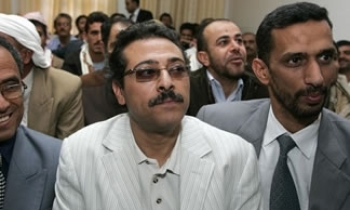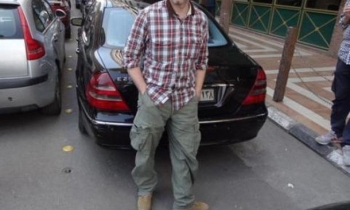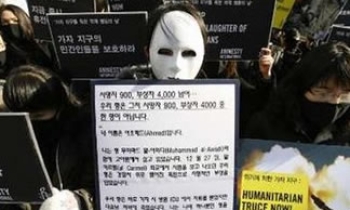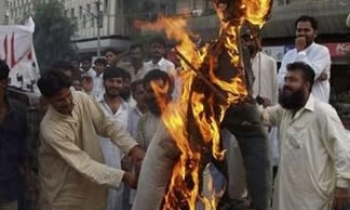The second jury trial of two men in the July 2004 murder of Forbes Russia Editor Paul Klebnikov had to be postponed again Wednesday after one of the defendants went missing. It was the second time that Kazbek Dukuzov, who is 32 or 33, failed to turn up at the Moscow City Court. Dukuzov missed a February hearing.

Dukuzov and Musa Vakhayev are accused of gunning down the 41-year-old US journalist on a Moscow street. Neither defendant appeared in court on February 15 when their retrial was initially scheduled to start; at the time, their lawyers cited illness and family reasons for the absences, local reports said.
The third man linked to the case, Moscow notary Fail Sadretdinov, was convicted in January on an unrelated crime and sentenced to nine years in prison.
Vakhayev was in court Wednesday, but court officials adjourned the proceedings until Dukuzov could be located. Vakhayev was not taken into pre-trial custody but had to sign a pledge not to leave Moscow, Russian news agency RIA Novosti reported. Several Russian reports quoted defence lawyer Ruslan Koblev as saying that Dukuzov did not appear in court because he was hospitalised in Chechnya.
“We call on authorities to locate Kazbek Dukuzov, determine why he failed to meet his court obligation, and impose appropriate sanctions,” Committee to Protect Journalists (CPJ) Executive Director Joel Simon said.
“This criminal case has been delayed indefinitely, and it won’t proceed until Dukuzov is found and arrested,” court spokeswoman Anna Usachyova said outside the courtroom, according to a Moscow Times report.
Dukuzov’s absence was met with concern and anger by Klebnikov family members who worry whether justice will be served. Klebnikov is just one of many journalists who have been killed during President Vladimir Putin’s tenure; very few of those cases has been successfully prosecuted.
On May 5, 2006, following a four-month-long trial, a Moscow City Court jury acquitted Dukuzov and Vakhayev of murdering Klebnikov. The trial was held behind closed doors and all participants, including the 12 jurors, were silenced by a gag order. Court officials justified the secrecy on the grounds of classified evidence and the safety of participants.

CPJ sources close to the trial said the measures did not guarantee the safety and impartiality of jurors, who were not sequestered and could be readily approached entering or exiting the courtroom. The presiding judge at the time, Vladimir Usov, and other court officials, did not stop the defendants or some defense representatives from making threatening statements in court that could have affected the jury, a CPJ source said. Those and other allegations of procedural violations raised doubts about the validity and fairness of the trial.
Six months after the verdict, on November 9, 2006 Russia’s Supreme Court overturned the acquittal of Dukuzov and Vakhayev and ordered a retrial. But the defendants were not taken into pre-trial custody then, kindling fears that they might leave the country to escape prosecution, CPJ sources said.
“Impunity in journalist murders is a pressing problem for Russia as President Putin acknowledged during his February 1 press conference at the Kremlin,” Simon said. “An open, fair trial in Klebnikov’s murder would demonstrate Russia’s commitment to solving this problem.”
Richard Behar, the investigative journalist who heads Project Klebnikov, a global media alliance formed to shed light on the Klebnikov case and those of other slain journalists in Russia, told the Moscow Times: “In my view, it’s doubtful that Russian law enforcement will locate the missing defendant, when they have not been able to even make arrests in the vast majority of cases involving the murders of reporters.”
Behar said, “To me, it’s also astounding that Russia is still refusing the offers from other governments to assist in the case. Russian officials concede that their judiciary is weak and not working well, so why not accept help? What’s the harm? That said, it remains to be seen if the U.S. government will use all its influence to see that justice is done, especially regarding the ultimate authorship of Paul’s murder.”









